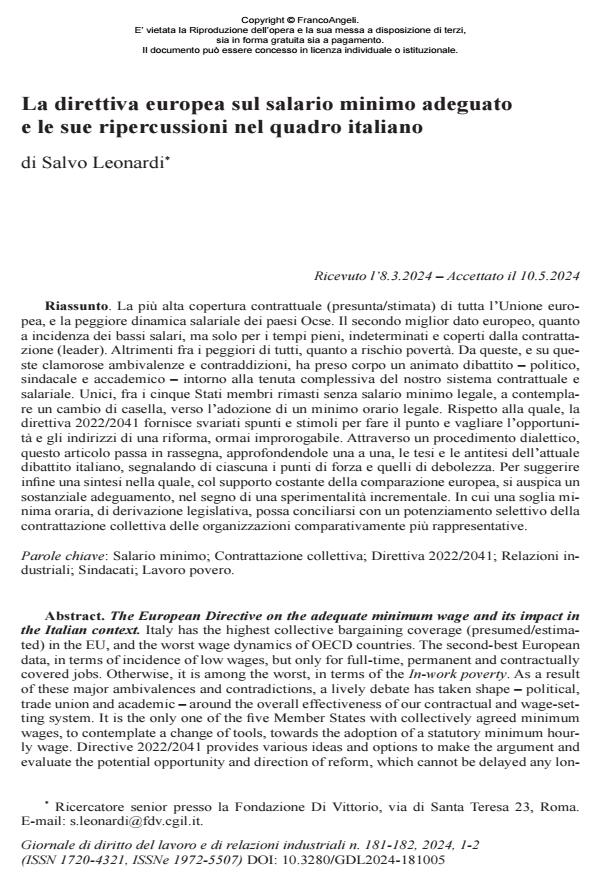La direttiva europea sul salario minimo adeguato e le sue ripercussioni nel quadro italiano
Titolo Rivista GIORNALE DI DIRITTO DEL LAVORO E DI RELAZIONI INDUSTRIALI
Autori/Curatori Salvo Leonardi
Anno di pubblicazione 2024 Fascicolo 2024/181-182
Lingua Italiano Numero pagine 33 P. 79-111 Dimensione file 884 KB
DOI 10.3280/GDL2024-181005
Il DOI è il codice a barre della proprietà intellettuale: per saperne di più
clicca qui
Qui sotto puoi vedere in anteprima la prima pagina di questo articolo.
Se questo articolo ti interessa, lo puoi acquistare (e scaricare in formato pdf) seguendo le facili indicazioni per acquistare il download credit. Acquista Download Credits per scaricare questo Articolo in formato PDF

FrancoAngeli è membro della Publishers International Linking Association, Inc (PILA)associazione indipendente e non profit per facilitare (attraverso i servizi tecnologici implementati da CrossRef.org) l’accesso degli studiosi ai contenuti digitali nelle pubblicazioni professionali e scientifiche
La più alta copertura contrattuale (presunta/stimata) di tutta l’Unione euro pea, e la peggiore dinamica salariale dei paesi Ocse. Il secondo miglior dato europeo, quanto a incidenza dei bassi salari, ma solo per i tempi pieni, indeterminati e coperti dalla contrattazione (leader). Altrimenti fra i peggiori di tutti, quanto a rischio povertà. Da queste, e su que- ste clamorose ambivalenze e contraddizioni, ha preso corpo un animato dibattito – politico, sindacale e accademico – intorno alla tenuta complessiva del nostro sistema contrattuale e salariale. Unici, fra i cinque Stati membri rimasti senza salario minimo legale, a contemplare un cambio di casella, verso l’adozione di un minimo orario legale. Rispetto alla quale, la direttiva 2022/2041 fornisce svariati spunti e stimoli per fare il punto e vagliare l’opportuni- tà e gli indirizzi di una riforma, ormai improrogabile. Attraverso un procedimento dialettico, questo articolo passa in rassegna, approfondendole una a una, le tesi e le antitesi dell’attuale dibattito italiano, segnalando di ciascuna i punti di forza e quelli di debolezza. Per suggerire infine una sintesi nella quale, col supporto costante della comparazione europea, si auspica un sostanziale adeguamento, nel segno di una sperimentalità incrementale. In cui una soglia minima oraria, di derivazione legislativa, possa conciliarsi con un potenziamento selettivo della contrattazione collettiva delle organizzazioni comparativamente più rappresentative.
Parole chiave:Salario minimo; Contrattazione collettiva; Direttiva 2022/2041; Relazioni industriali; Sindacati; Lavoro povero.
- La misurazione delle soglie di adeguatezza del salario minimo nell'ordinamento multilivello Luca Ratti, in GIORNALE DI DIRITTO DEL LAVORO E DI RELAZIONI INDUSTRIALI 185/2025 pp.57
DOI: 10.3280/GDL2025-185005
Salvo Leonardi, La direttiva europea sul salario minimo adeguato e le sue ripercussioni nel quadro italiano in "GIORNALE DI DIRITTO DEL LAVORO E DI RELAZIONI INDUSTRIALI " 181-182/2024, pp 79-111, DOI: 10.3280/GDL2024-181005